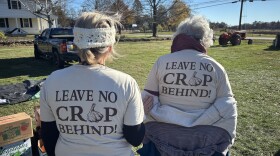Years ago, the members of the community at Canterbury Shaker Village grew their own food, and sold some of the surplus to residents in the area. There hasn’t been farming on the site for a number of years. That’s why farm manager Stacey Cooper was pleasantly surprised to find the soil in such good shape.
"I was a bit surprised that the nutrient analysis was as balanced as it was," Cooper said, as she looked over the roughly 3/4ths of an acre that make up her farmland. "It didn't need much at all - a testament to how well they took care of their land."

Cooper has broccoli, cabbage, kale and chard in the ground now; in the hoop house up the hill, there are even more plants. "These crops are exploding," she says, "so I’ll be harvesting lettuce, spinach and arugula today. We’ve already run through our pea tendrils and radish. We’ve got some beets that are doing really well."
These crops are here because of a partnership with the Concord Cooperative Market. The coop’s Greg Lessard says while local organic food production has been growing in recent years, the demand has grown even faster. “As much as we worked with the local farmers, we just couldn't get enough of certain things - fresh fruit, organic tomatoes," Lessard explains. 'They were saying, we need our own organic garden. And then the bulk area said, wouldn’t it be nice if we had our own honey?”
The coop was also looking for a dedicated space to hold events and classes, one that could hold more participants than the market’s own space. The coop put the word out that it was looking for land and building space. That caught the attention of Shaker Village Executive Director Funi Burdick:
"I thought, is there a way that the food co-op would see our Shaker organic gardens as a place to till?" Burdick said. "And so I gave them a call."

The two sides started talking, and about six months later the partnership was in place – just in time for the coop to hire Stacey Cooper and get her seeds into the ground. Cooper’s crops have already started showing up on the produce shelves; in time they will be available on the grounds of the Shaker Village as well, and will be used in the Co-op's catered events.
And Greg Lessard says there could be much more in the works, from revitalizing the apple orchards to restoring the Village’s Bee House.
"I just put the little fence there," he says, surveying the house. "It's got the piping for the bees to come in. And the observation tower hive will have the bees this week and should be in place, and then open to the public, I think, within the month."

For FuniBurdick and the Shaker Village, the partnership is part of a broader effort to show visitors what Shaker life meant – and still means today.
"The real value to history museums is to activate people’s minds - how they can look at the things you're showing, and see that, actually, a table isn’t a table, a table might embody a whole view of the world," Burdick says. "And so in many ways, looking at how they approached using the land is a way of activating people into thinking about how to live responsibly."
Burdick points to several other food-related partnerships aimed at embodying the Shaker worldview. The village offers grazing space for Brookford Farm’s cattle, and it established the Shaker Table restaurant as a learning space for culinary arts students at Lakes Region Community College.
"So perhaps in the case of the food coop, you would go off to the gardens and you would start to understand how to treat your land with respect and understand how renewable that land had to be," Burdick says. "People would be studying seed harvesting, for instance. You might go and look across the field and perhaps someone is leading a yoga class, so that you’re really experiencing the beauty of the landscape and the spirituality that's here."

The woman in charge of the farmland, Stacey Cooper, is set to start harvesting more crops this afternoon. And to make sure this land is ready for the future.
"The soil hasn't been turned in a few years, so the weed pressure is pretty intense," Cooper says. "We've already tilled most of the unplanted rows three times now, and the weeds are back yet again. But that’s going to be the challenge of the first season.
"Fortunately we have great soils here, so a little bit of working and by next season I think we’ll be in great shape."









